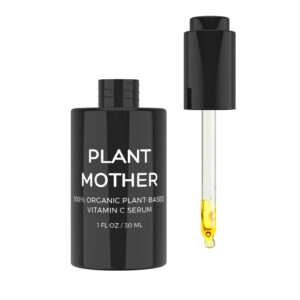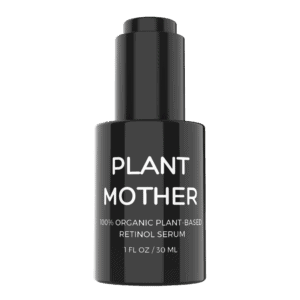The Ultimate Guide To Vegan Retinol

TOP 20 THINGS YOU NEED TO KNOW ABOUT VEGAN RETINOL
In this blog post, you’ll get answers to all the burning questions about vegan retinol – its use, benefits, and the difference between prescription-based and natural plant-based retinol. Here is an overview of the topics this article covers:
- What Is Vegan Retinol?
- Retinol Benefits: What Does Vegan Retinol Do?
- How Does Vegan Retinol Work?
- Is Plant-Based Retinol Good for Your Skin?
- Is Vegan Retinol Better than Conventional?
- Should You Use Retinol Serum or Cream?
- What Botanical Ingredients Are Best Retinol Alternative?
- More Botanicals Rich In Natural Retinol
- Things To Look For In Botanical Retinols?
- Retinol and Vitamin C: Can You Use Vitamin C With Retinol?
- Can You Combine Moisturizer With Retinol?
- Is Retinol Safe?
- Can You Use Vegan Retinol For Under Eye Wrinkles?
- How To Use Vegan Retinol? Can You Use It Every Night?
- Do You Need To Wear SPF with Retinol?
- What Should You Not Mix Retinol With?
- Can You Use Salicylic Acid With Retinol?
- Should You Use Niacinamide With Retinol?
- Can You Use Hyaluronic Acid With Retinol?
- Does Retinol Help Acne?
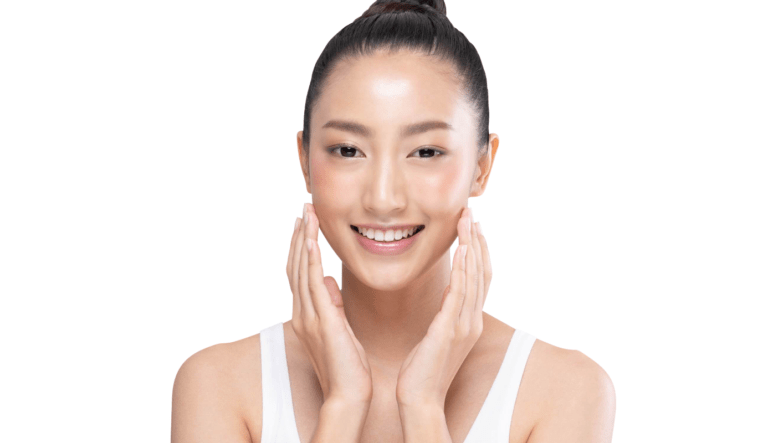
1. WHAT IS VEGAN RETINOL?
Retinol can be animal-based and plant-based, derived from these two very different sources.
Retinoids are animal-derived retinols sourced from enzymes found in milk and eggs. They are man-made, produced in a lab. They are basically synthetic copies of something our bodies can take from natural vegan sources and convert into a powerful Vitamin A.
Plant-based retinol comes from plants rich in proVitamin A contained in carotenoids. Carotenoids are natural botanical forms of retinol derived from various plant-based substances such as seeds and pulps of carotenoid-rich botanicals.
Many plants are rich in beta-carotene, a substance that converts to vitamin A inside our bodies, making these plants a perfect option for vegans as well as people with sensitive skin and women who’re pregnant or breastfeeding.
If you’re searching for plant-based alternatives to retinol, look for a formulation with carotenoids and botanical ingredients rich in provitamin A. Plant Mother’s Retinol Serum is 100% organic and vegan. Moreover it is packed with fresh natural ingredients such as sea buckthorn seed oil, sea buckthorn berry oil, bakuchiol, rosehip seed oil, carrot seed oil and many others.
2. Retinol Benefits: What Does Vegan Retinol Do?
Vegan retinol is known to accelerate skin renewal and reduce the appearance of wrinkles, fine lines and age spots and to make a firmer, smoother and more evenly-toned skin. Many who use plant-based retinol products also report that it reverses the effects of sun damage, while also enhancing collagen production. Collagen is one of the key ingredients to healthy and youthful skin at any age.
Vegan retinol does all these improvements to the skin, without being harsh to the skin. Most first-time retinol users complain of skin purging. Vegan retinol never causes any purging, redness, or irritation. Synthetic retinols tend to make your skin more sun sensitive and susceptible to sunburns. Natural, plant-based retinols don’t cause sun sensitivity. However, it is always good to use SPF.
There is a distinction between tretinoin vs retinol. They both belong to a larger category of retinoids. But plant-based retinol is a better and healthier choice, especially for a dry or sensitive skin.
3. How Does Vegan Retinol Work?
Vegan Retinol Serum is a long- term investment in your skin’s health. Therefore, patience is key. When starting with retinol, you’re not going to look like you got a facelift. You shouldn’t get discouraged if you don’t see results right away. The results of rejuvenated and glowing skin take time.
You will probably notice the effects if you stop using it for a couple months. First thing you’ll notice is your skin looking dull. Women who’ve consistently used botanical retinol serum have noticed a huge difference in their skin over time. It’s like they aged backwards and there are visible improvements to their skin texture and brightness.
shop OUR vegan best sellers:
4. Is Plant-Based Retinol Good for Your Skin?
Yes, unlike conventional retinol, plant-based retinol is nutritious and safe for your skin. Side effects of vegan retinols are extremely rare. Synthetic, animal-based retinol on the other hand can be harsh to the skin. The retinol caused side-effects are usually referred to as “retinol uglies”. Make sure you don’t confuse these retinol uglies with skin purging that can happen as well. These are some of the side effects:
- Redness
- Irritation
- Burning
- Itching
- Dry skin
- Flaking and peeling of the skin
- Increased sensitivity to the sun
None of these side-effects occur when you use natural, plant-based retinol. A good example is Plant Mother’s Vegan Retinol. It is created to help people with sensitive skin who don’t want to cope with retinol uglies. It is also good for pregnant or breastfeeding women, women (and men) with dry or sensitive skin.
Plant Mother’s Retinol Serum is a safe alternative to synthetic retinol. It balances your hormones and your skin pH level, giving you a healthy rejuvenated skin.
5. Is Vegan Retinol Better than Conventional?
Vegan retinol is always better than the harsh synthetic one. However, it is important to know the difference between retinoid vs retinol. Also between retinol vs tretinoin.
Natural plant-based retinol is safe and doesn’t have side-effects related to synthetic retinol. The good thing is that it’s as potent as synthetic retinol in the long run. It won’t cause the red, burning, flaky side effects of synthetic retinol. Additionally, if you’re vegan and don’t support the idea of using animal-derived ingredients in your skincare – plant-based retinol is a perfect choice for you.
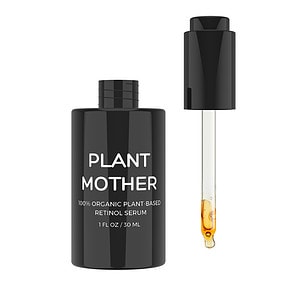
6. SHOULD YOU USE RETINOL SERUM OR CREAM?
While retinol is available in various forms, from creams to essences, one of the best and most powerful forms is retinol serum. Serums provide nourishment together with repair which creams don’t. Most creams are made to deliver a certain percentage of retinol. Serums on the other hand, especially if applied as a first step on a clean skin, feed your skin in addition to providing active ingredients.
Plant Mother Vegan Retinol Serum is formulated to provide over 200 nutrients and multivitamins in addition to the purest botanical retinol. That makes it a unique product in the clean beauty space.
7. What Botanical Ingredients Are Best Retinol Alternative?
The following plants are the richest sources of proVitamin A, carotenoids, anti-oxidants, and essential fatty acids. When reading labels and trying to decide which plant-based retinol product is best for you, look for these powerful botanicals:
- SEABUCKTHORN BERRY
One of the most nutritious anti-aging plants. High in Omega 7 and provitamin A, with essential fatty acids and carotenoids. It nourishes skin, hydrates, rejuvenates, heals age spots, sun spots, and other environmental factors.
- SEABUCKTHORN SEED
Even though this oil comes from the same plant, it has a different nutritional makeup than sea berry oil. It is as powerful antioxidant and source of natural retinol as sea buckthorn berry oil. The major components of the seeds are provitamin A (together with C, E, K, folic acid), large amounts of carotenoids, flavonoids, and fatty acids. Sea buckthorn seed oil improves skin elasticity, stimulates hydration of epidermis, and has a strong regenerative and anti-aging effect.
- BAKUCHIOL
Probably the most famous natural retinol alternative, Bakuchiol has strong anti-aging and retinol-like properties. Bakuchiol helps rejuvenate the skin and fights hyper pigmentation and photo aging. Because of its strong antioxidative property, it has been glorified in traditional Chinese medicine. Bakuchiol displays nearly twice the antioxidative potential as that of vitamin E. It is most effective when combined with carotenoids as it is in Plant Mother’s Organic Retinol. It is important to know the difference between bakuchiol vs retinol, which one to use, and why.
8. More Botanicals Rich in natural retinol
- ROSEHIP
After bakuchiol, sea buckthorn berry, and sea buckthorn seed oils one of the most powerful sources of natural vegan retinol. There are different types of seeds that a rosehip oil can be extracted: rosa moschata, rubiginosa, and canina, among others. Seeds are extremely rich in Vitamin C, provitamin A, and E which are essential for anti-aging.
Rosehip is famous for its botanical composition, nutritional value, and anti-aging power. Its composition is rich in essential fatty acids (omega 6, 3, linoleic acid) which is important for rejuvenation, hyperpigmentation, and sun damage protection.
- CAROT SEED OIL
Carrot seed oil is one of the powerful natural retinol alternatives rich in carotene and provitamin A. It helps stimulate cell-regeneration, soothe wrinkles and boost collagen production. Because of its high carotenoid content, carrot seed oil acts as an anti-aging oil for face. It is a good antioxidant and protector from UV rays, pollution and environmental stress.
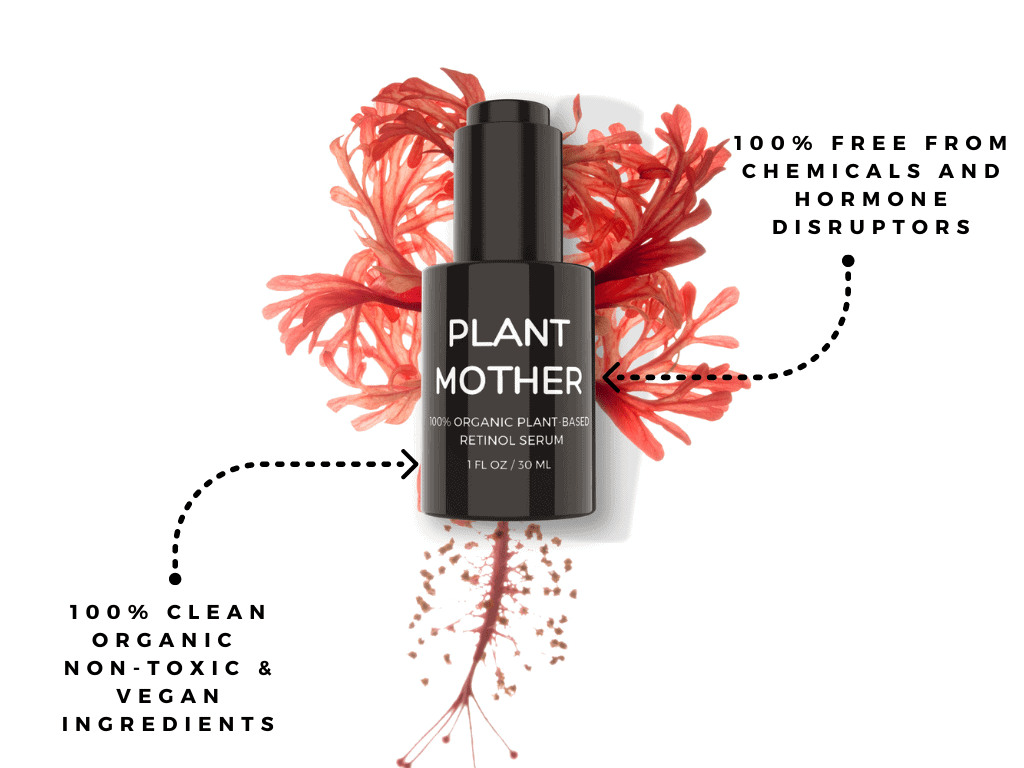
Plant-based Retinol is like a 401K. You won’t see an amazing benefit right away, but years from now you’ll be very glad you made the investment.
RETINOL SERUM
100% ORGANIC VEGAN CLEAN
9. Things To Look For In Botanical Retinols?
Not all botanical retinols are the same. Selection, dosage, and the right combination of botanicals in a plant-based retinol formulation is as important as it is the origin and quality of botanical ingredients. The way they are cultivated, harvested, and processed is also important.
When looking for a good natural alternative to retinol, inform yourself on which plants have the highest amount of carotenoids as well as what actives to combine these carotenoids with to intensify Retinol’s power and increase its absorption.
Plant Mother Retinol formula contains a bounty of carotenoids combined with selected anti-oxidants that are great natural stabilizers of Retinol. There’s also quercetin from passion fruit that helps intensify and synthesize vitamin A better. Its natural ingredients are of the highest quality, carefully selected to achieve the most potent yet gentle product.
10. Retinol and Vitamin C: Can You Use Vitamin C With Retinol?
Retinol and Vitamin C shouldn’t be mixed together, however there’s a safe and effective way to use them. You should opt for a Vitamin C in the morning, followed by an SPF. Then in the evening apply retinol serum as part of your night-time routine. Additionally, you can use them on alternate days / nights if that works better for your skin.
Remember to always test first because each skin is unique and has a different level of sensitivity. Plant Mother’s Vitamin C Serum combines perfectly with the organic Retinol due to their synergistic ingredient compatibility. It supplies the skin with both plant-based niacinamide and vitamin C (in one serum). Together, these powerful ingredients feed the skin and provide everything your skin needs long term to be healthy, nourished, and youthful.
11. Can I Combine Moisturizer With Retinol?
You can, depending on the texture and composition of the moisturizer and Retinol you choose. Plant Mother’s Retinol Serum is as nourishing as it is moisturizing so you won’t need to apply moisturizer after it. This is true for most vegan retinols. Unlike synthetic retinols, they don’t dry or irritate skin.
If you use a prescription-based retinol, you may need to use moisturizer to fight any dryness that may occur. And as with any other retinol, wear it at night. Use an SPF during the day to protect the skin.
12. Is Retinol Safe?
Prescription retinoids such as Tretinoin (Retin-A, generic), tazarotene (Avage, Tazorac), and adapalene (Differin) can be too harsh for almost every type of skin when you first introduce it into your skincare routine. So a short answer is yes, prescription retinols are safe but come with retinol uglies we mentioned above.
Plant-based retinols are safe and don’t (or very rarely) cause any retinol uglies such as redness, irritation, or peeling of the skin. Hence a gentler plant-based product with retinol is preferable for all skin types. This is especially true for people with sensitive skin, pregnant, or breastfeeding moms. Plant Mother’s Retinol Serum is safe for all skin types and all skin colors. Many pregnant and nursing moms ask us about the use of retinol and vitamin C serum while breastfeeding.
Don’t risk using synthetic, lab-produced Retinol or Vitamin C because they’re often mixed with harsh chemicals. Only use healthy, safe, clean, vegan alternatives. And, of course, consult your doctor before adding any new product to your skincare routine while breastfeeding or pregnant.
13. Can I Use Vegan Retinol For Under Eye Wrinkles?
It depends on the retinol formula – some retinols are too harsh to be used on a delicate and thin under-eye area. It also helps to know the difference between bakuchiol vs retinol. Before you start using any new product do a small patch test to make sure the formula agrees with your skin. Even better, seek an eye serum or cream developed to target under-eye area specifically.
Make sure the retinol formula you use under or around your eyes is chemical-free, natural, and plant based. That will reduce the risk of sensitivity in the under eye area. Alternatively, some men and women decide to combine plant-based Retinol serum with under eye filler. This can be an optimal rejuvenating solution for the individuals with hollow under eye area, dark circles, and a “tired” look.
14. When To Use Vegan Retinol? Can I Use Retinol Every Night?
Yes, plant-based retinol should and can be used every night. If you have a multi-step night skin care routine, start off with retinol as a first step, after you wash your face. Wait at least 30 minutes to apply other products.
If you use synthetic prescription-based retinoids such as Retin-A, start with a lighter dose of around 0.25 percent and work your way up as your skin becomes adjusted. Depending on how your skin reacts you may start with 2-3 nights a week and work your way up after a month or so.
15. Do I need To Wear SPF with Retinol?
Preventing photo aging and increasing your sun protection is an absolute must for all retinol users. Synthetic retinols are making your skin more sun sensitive and susceptible to sunburns. Natural plant-based retinols are better in that regard and don’t necessarily require an SPF but it is a best practice to protect your skin with SPF anyways, even during the winter.

16. When To Start Using Retinol?
While each skin is different and every person ages differently, the best time to start using retinol is typically in your mid-late twenties. Retinol is a long-term play (just like your 401K) and the earlier you start nourishing and protecting your skin from premature aging the better.
17. Can you use salicylic acid with retinol?
Most experts agree that salicylic acid (being a form of BHA) shouldn’t be mixed or paired with retinol. However, it all depends on what formulation of salicylic acid and retinol you intend to use. You can use BHA in the morning and retinol at night, apply them on alternating days, or use retinol every night and incorporate BHA into your routine one to two times a week. If you notice your skin gets red or dry, stop BHA altogether.
18. Should you use niacinamide with retinol?
Yes, some people even mix them together. Niacinamide and retinol are good together. If retinol is in a form of a serum, make sure you always use the serum first. Serums have multiple nourishing ingredients on top of actives and therefore need to be fed into the skin as a first step after cleansing. All other products, including niacinamide should be layered in after. Niacinamide goes well with many ingredients, e.g. Niacinamide and Vitamin C serum or cream can also be used together.
19. Can I use hyaluronic acid with retinol?
You can as long as you make sure that hyaluronic acid is applied to lock in the moisture. It can come right after cleaning directly on your damp skin. If your retinol product comes in a moisturizing formulation, then you can layer in the hyaluronic acid right after your retinol product.
20. Does Retinol Help Acne?
Again, it depends on a retinol formulation. Most retinols do help acne but they’re usually only part of a more comprehensive treatment plan for acne.

vegan retinol - Conclusion
Retinol is one of the most popular and widely used skincare agents for anti-aging, photo-aging as well as for fighting acne. There are many scientific studies that swear by retinol and demonstrate that it reverses signs of aging and fights stubborn acne. However, not all retinols are the same. Organic Clean Vegan Retinols are the best because they are good for your skin and good for the planet. They are some of the gentlest and most effective anti-aging products on the market.
medical disclaimer
This content is for informational and educational purposes only. It is not intended to provide medical advice or to take the place of such advice or treatment from a personal physician. All readers of this content are advised to consult their doctors or qualified health professionals regarding specific health questions. The publisher of this content does not take responsibility for possible health consequences of any person or persons reading or following the information in this educational content. All viewers of this content, especially those taking prescription or over-the-counter medications, should consult their physicians before beginning any nutrition, supplement, skincare product, or lifestyle program.

